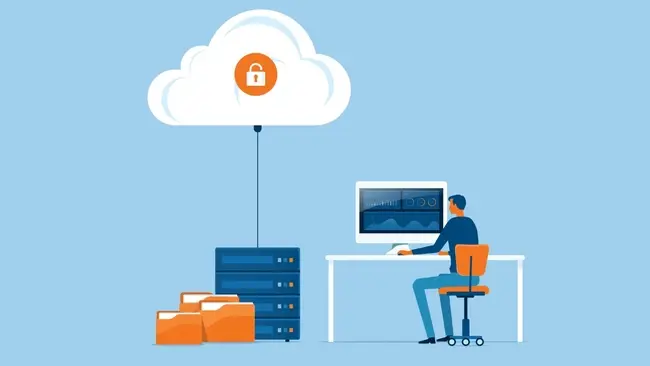In today's data-driven world, ensuring the safety and availability of your data has never been more important. Whether you're a small business or a large enterprise, the loss of critical data can be devastating. That's why so many companies rely on backup as a service (BaaS) to keep their data secure.
In this comprehensive guide, we’ll explore what BaaS is, its various types, and some of the leading BaaS providers in the market.

What is backup as a service?
Backup as a Service (BaaS) is a managed, cloud-based service that allows you to back up your data on a remote cloud server. With BaaS, your files, folders or entire application workloads are stored in a hybrid cloud or off-site data centre – safe from unauthorised access, hacking, and cyber attacks.
When data is lost, you can instantly recover their data from the cloud backup, just as they would an on-prem backup system. Many organisations switch to BaaS when they have outgrown their own backup systems and cannot afford costly on-prem, backup upgrades.
BaaS providers typically charge on a subscription basis, so organizations only pay for the services they use. This can save organizations a significant amount of money, especially when compared to the cost of maintaining on-prem backup systems.
BaaS is also a good option for organizations that are looking to improve their data security. BaaS providers typically have a team of security experts who are responsible for the security of their platform. This can help organizations reduce their risk of data breaches and other security incidents.
How does backup as a service work?

Backup as a service secures applications and data across a hybrid cloud that is managed by a provider. While the business retains access to the backed-up data, it is managed and maintained by the provider. Data can be backed up as much as needed, and the business can instantly access the data whenever they need it.
BaaS solutions often work on a subscription-based model. Users subscribe to a BaaS provider's services, and in return, the provider offers a range of features such as data backup, storage, security, and recovery.
Types of Backup as a Service
BaaS services come in several different types, each catering to different business needs and scenarios. Here are some of the most common types:
File-Level BaaS
File-level BaaS focuses on backing up individual files and folders. It's suitable for small-scale data protection and is often used by individuals or small businesses. File-level BaaS is user-friendly and typically offers easy file recovery options.
Image-Level BaaS
Image-level BaaS takes a snapshot of an entire system or server, including the operating system, applications, and data. This type of BaaS is suitable for businesses that need to quickly recover entire systems in case of a failure. It's often used in conjunction with virtualization technologies.
Database-Level BaaS
Database-level BaaS is designed specifically for backing up databases, which are critical components of many applications and systems. This type of BaaS ensures the consistency and integrity of database backups, making it essential for organizations reliant on databases.
Server-Level BaaS
Server-level BaaS goes beyond individual files and focuses on backing up entire servers. This is especially useful for businesses with complex server infrastructures that need comprehensive data protection.
Cloud-to-Cloud BaaS
As more businesses migrate to cloud-based applications and services, the need for cloud-to-cloud BaaS has grown. This type of BaaS focuses on backing up data within cloud applications like Microsoft 365, Google Workspace, or Salesforce.
Benefits of Backup as a Service
Many of the key benefits of backup as a service lie in the fact that it automates the process of storing and managing data, reducing the risk of data loss caused by human error, cyber-attacks or other unforeseen events. They also streamline the backup process, reducing the workloads for internal IT terms and data engineers so they can focus on more important tasks.
BaaS solutions offer many other benefits, including:
- Data Protection. The primary purpose of a backup of a service is to protect your data. With regular backups and secure storage, your critical information is safe from various threats, including hardware failures, cyberattacks, and accidental deletions.
- Cost-Efficiency. BaaS eliminates the need for investing in and maintaining on-premises backup infrastructure. Instead, you pay for the service based on your storage needs, making it a cost-effective solution.
- Scalability. As your data grows, BaaS providers can easily scale their services to accommodate your increasing storage requirements. This scalability ensures that you always have enough space to back up your data.
- Accessibility. With BaaS, you can access your backed-up data from anywhere with an internet connection. This is especially useful for remote workforces and businesses with multiple locations.
- Automation. BaaS solutions often come with automated backup scheduling and management, reducing the need for manual intervention. This minimizes the risk of human error and ensures consistent backups.
- Disaster Recovery. In the event of a disaster, such as a fire or flood at your physical location, BaaS ensures that your data remains accessible and can be quickly restored to a new location or system.
Backup as a Service Providers
Now that we've explored the different types and advantages of Backup as a Service, let’s look at some of the leading BaaS providers in the market. When choosing a BaaS provider, it's crucial to consider factors like reliability, security, scalability, and cost. Here are some of the best BaaS providers on the market today:
Amazon Web Services (AWS) Backup
AWS Backup is a comprehensive BaaS solution that allows users to protect data across various AWS services, including Amazon S3, EBS, RDS, and more.
- Key Features: Centralized backup management, policy-driven automation, and integration with AWS services.
- Pros: Scalability, integration with other AWS services, and a pay-as-you-go pricing model.
- Cons: Can be complex for users new to AWS.
Veeam Backup & Replication
Veeam is a leading provider of backup solutions, offering both on-premises and cloud-based options.
- Key Features: Image-level backups, ransomware protection, and cross-cloud data management.
- Pros: Excellent data recovery options, user-friendly interface, and support for hybrid environments.
- Cons: Costs may add up for larger companies.
Acronis Cyber Backup
Acronis Cyber Backup is known for its comprehensive data protection, including backup and cybersecurity features.
- Key Features: AI-based ransomware protection, disaster recovery, and cloud and on-premises backup options.
- Pros: Strong security features, easy deployment, and hybrid cloud support.
- Cons: Pricing can be on the higher side for some users.
Microsoft Azure Backup
Azure Backup is part of Microsoft's cloud services and provides a seamless BaaS solution for Azure users.
- Key Features: Integration with Azure services, long-term retention, and support for hybrid environments.
- Pros: Integration with Azure ecosystem, straightforward pricing, and compliance certifications.
- Cons: Limited support for non-Microsoft platforms.
Backblaze B2 Cloud Storage
Backblaze B2 offers a simple and cost-effective cloud storage solution with BaaS capabilities.
- Key Features: Easy setup, data durability, and low storage costs.
- Pros: Affordable pricing, user-friendly interface, and support for multiple platforms.
- Cons: Limited advanced features compared to some other BaaS providers.
Conclusion
Backup as a Service (BaaS) is a vital component of modern data management and protection strategies. It provides a secure and efficient way to back up your data, ensuring its availability and integrity in the face of various threats.
By understanding the meaning of BaaS, its different types, and the advantages it offers, businesses can make informed decisions about implementing BaaS solutions that best suit their needs. Additionally, considering leading BaaS providers like AWS Backup, Veeam, Acronis, Microsoft Azure Backup, and Backblaze can help you find the right partner to safeguard your critical data.
Remember that your choice of a BaaS provider should align with your specific business requirements, budget, and long-term data management goals. With the right BaaS solution in place, you can have peace of mind knowing that your data is safe and easily recoverable whenever you need it.







Comments ( 0 )